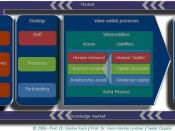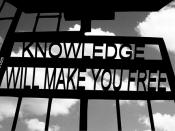How many times have you found yourself hopelessly trying to explain something to someone but just couldn't get the message across? Frantically, you try to explain what it is you want to say, but the more you try the less sense you seem to make. Confused, humiliated and stressed out, you give up, leaving the other people even more confused. And how many times has a friend been telling you a story in a hesitant manner, finding it difficult to get the message across, and you just sit there, bewildered, having absolutely no idea what they are talking about. We all know what we want to say, but communicating and getting the message take a whole other level of understanding of the subject at hand. But if only you know it, and you can't seem to communicate it, is it knowledge?
There are many ways of communication, some much more complex and refined, hence more difficult to make yourself clear, some simpler and straight forward.
Usually people use more then one form of communication, especially where understanding is fundamental, such as teaching, as opposed as more subtle areas, such as literature. Referring to the ToK diagram, the ways of knowledge most involved are language, reason and perception. Language is possibly the most controversial issue as there are thousands of languages and dialects, and the boundaries for the ability to speak and comprehend it are immense. A person might be trying to say something to a person of very limited language capabilities. If the communicator is very adaptable, he should be able to communicate his 'knowledge' to someone of poor language skills. This agrees with the statement above. However, we could also have a genius rocket scientist, specialist of advanced quantum mechanics who might be unable to explain to this person...


